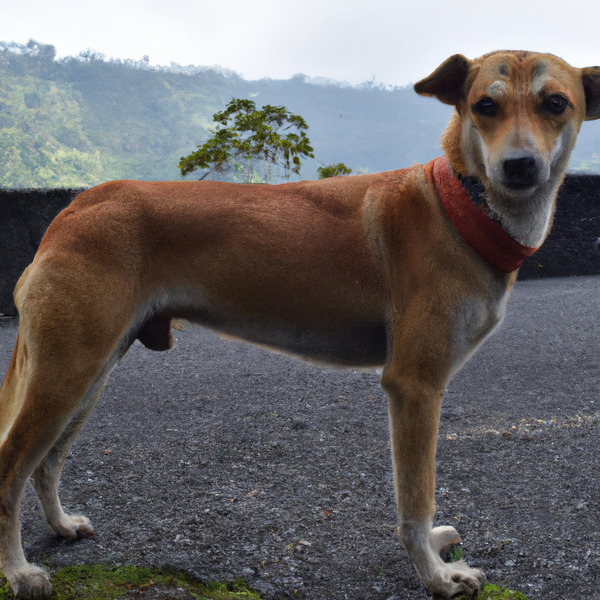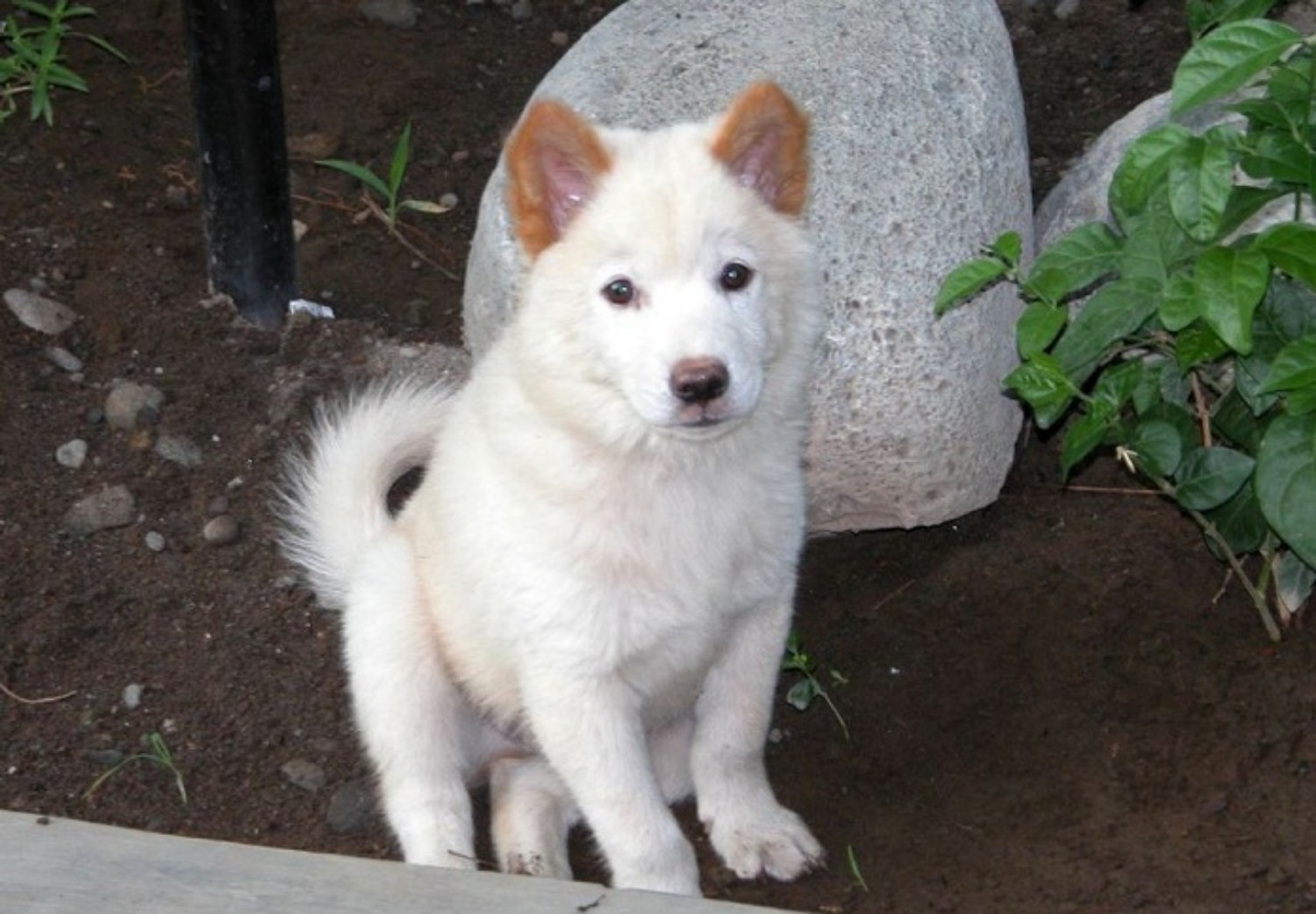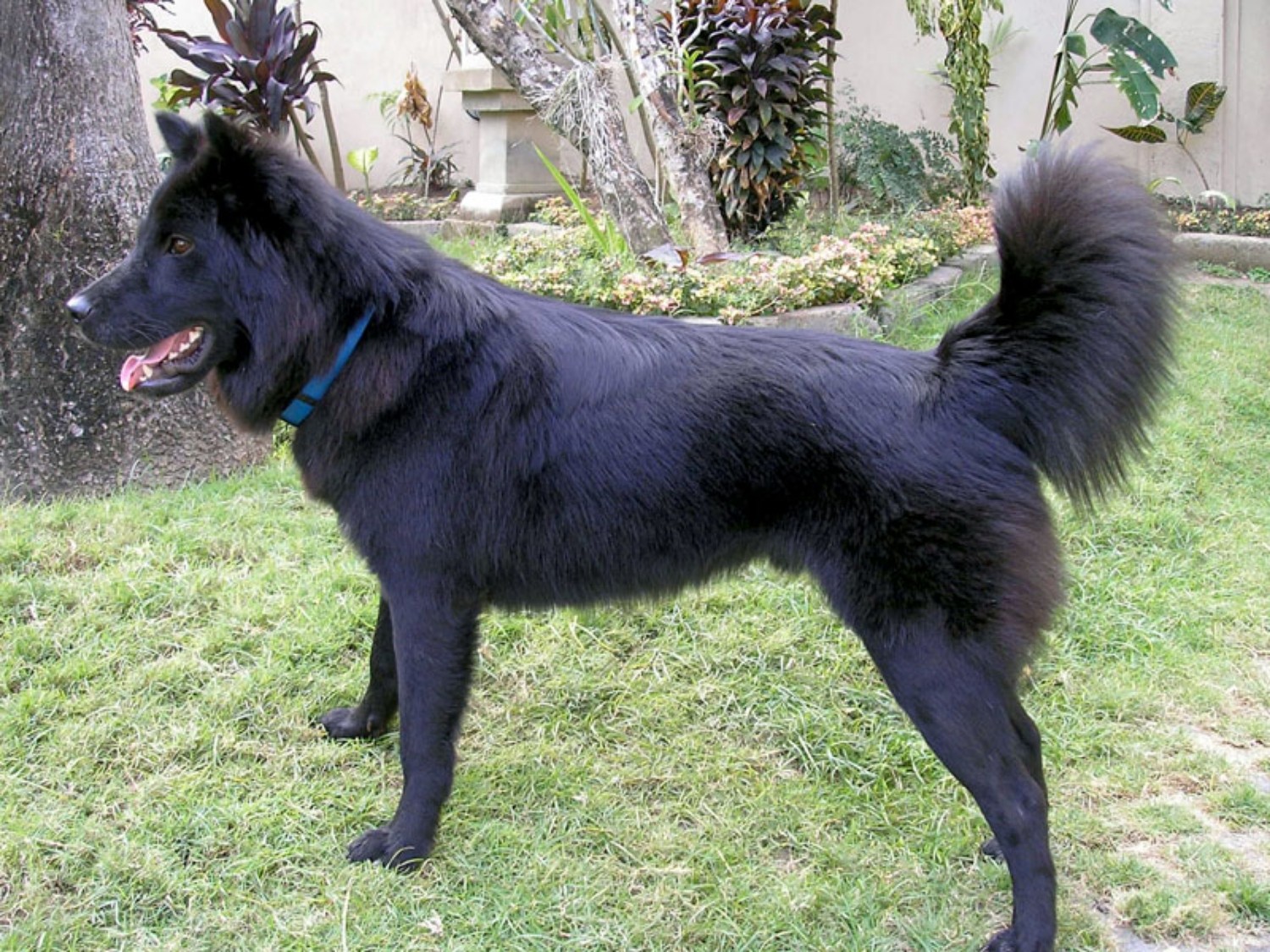Kintamani
also known as Balinese Kintamani, Balinese Mountain Dog, Balinese Dog, Bali-Berghund, Kinta

Breed Information
Is Kintamani a purebred?
Purebred
What were Kintamanis originally used for?
Companion
How Long Do Kintamanis Live? What is average life expectancy for a Kintamani? How long can Kintamanis live?
13-15 years
The average Kintamani lifespan is somewhere between 13-15 years, provided they aren't beset by any exceptional health issues or injuries.
Kintamani Height & Weight
How big is a full grown Kintamani?

| Height | ||||
|---|---|---|---|---|
| Average | 6 months | 12 months | 18 months | |
| Male | 18-22 inches (45.7 - 55.9 cm) | 18.0 inches (45.7 cm) | 20.0 inches (50.8 cm) | 20.0 inches (50.8 cm) |
| Female | 16-20 inches (40.6 - 50.8 cm) | 21.0 inches (53.3 cm) | 17.0 inches (43.2 cm) | 18.0 inches (45.7 cm) |
| Weight | ||||
|---|---|---|---|---|
| Average | 6 months | 12 months | 18 months | |
| Male | 33-37 pounds (15 - 17 kg) | 26.5 pounds (12 kg) | 35.0 pounds (16 kg) | 35.0 pounds (16 kg) |
| Female | 29-33 pounds (13 - 15 kg) | 23.5 pounds (11 kg) | 31.0 pounds (14 kg) | 31.0 pounds (14 kg) |
Do Kintamanis get fat easily?
![]()
![]()
![]()
![]()
![]()
The Kintamani is a dog breed that has a low risk for obesity. This means that they are less prone to gain weight than many other breeds, but it is still important to monitor their food intake and ensure they get enough exercise to maintain a healthy weight and overall well-being.
Are Kintamanis Hypoallergenic?
No
Unfortunately, the Kintamani is not hypoallergenic, making it not a good choice for a dog lover who suffers from pet allergies.
What is a Kintamani personality? What are Kintamani dogs best known for?
Intelligent
Gentle
Loyal
Alert
Are Kintamanis heavy shedders? How Much Does a Kintamani Shed?
![]()
![]()
![]()
![]()
![]()
Kintamani dogs are not heavy shedders, but they will lose a significant amount of hair each year. To decrease the amount of shedding, you can regularly brush your Kintamani. This will remove loose hair and keep his coat growing in the same direction.
What is the watchdog ability of a Kintamani dog?
![]()
![]()
![]()
![]()
![]()
The Kintamani dog is one of the best choice if you want a good watchdog. This breed will keep watch over you and your family at all times. This breed takes this task seriously and will typically perform its guarding duty with little to no training. This dog will require obedience training, or you can consider guard dog training to sharpen its skills.
Breed History
Where do Kintamanis come from?
Bali
What are Kintamanis descended from?
Unknown
When were Kintamanis first bred? How old is the Kintamani breed?
Unknown

Kintamani Appearance
What color are Kintamani eyes?
Brown
What color can Kintamani nose be naturally?
Black
What color can Kintamani coat be naturally?
White
Pied
Black
How long is a Kintamanis coat?
![]()
![]()
![]()
![]()
![]()
The coat of a Kintamani falls in the medium length category.
How Dense Is The Kintamani Coat?
![]()
![]()
![]()
![]()
![]()
What is the texture of the hair of a Kintamani?
Straight
How many puppies can a Kintamani have in a litter? How many puppies can a Kintamani have in her first litter?
13-15 puppies per pregnancy
A Kintamani can have a litter of 13-15 puppies on average. However, it's worth noting that the size of the litters can vary greatly. Factors that can influence litter size include the health of the mother, breeding history, and genetics.
![]()
![]()
![]()
![]()
![]()
Kintamani dogs generally adapt well to changes in lifestyle and different living environments, but it is considered as an average level of adaptability compared to other breeds.

Kintamani Health Issues
Do Kintamanis have a lot of health problems?
![]()
![]()
![]()
![]()
![]()
The Kintamani breed is commonly healthy with low vet costs, regular check-ups may not be as necessary but it's important to keep an eye on their health and have them checked by a veterinarian when needed.
What are the major health concerns to be aware of when owning a Kintamani?
Usually A Very Healthy Breed
What are the less significant issues to keep in mind when it comes to Kintamanis?
Skin Problems
None Known
What are the occasional tests recommended for Kintamani breed?
Physical Examination
Skin Cytology Sample

Kintamani Needs and Activities
Do Kintamanis have a lot of energy?
![]()
![]()
![]()
![]()
![]()
For those who lead a balanced lifestyle, Kintamanis may be a good choice as they have an average energy level.
Do Kintamanis need socialization? How social are Kintamanis?
![]()
![]()
![]()
![]()
![]()
Kintamani have above average social needs compared to other breeds.They thrive in environments where they have a lot of interaction with humans and other dogs.
How much exercise should Kintamanis get?
![]()
![]()
![]()
![]()
![]()
The Kintamani needs a high level of physical activity to maintain a healthy lifestyle. They also make great companions for people who lead an active lifestyle and enjoy running, hiking or other outdoor activities. These breeds are not suitable for people with sedentary lifestyle or those who live in small apartments
How much sleep should a Kintamani have? Do Kintamanis sleep a lot?
![]()
![]()
![]()
![]()
![]()
The Kintamani breed is known for its moderate energy levels and normal sleep patterns, typically sleeping around 12-14 hours per day.
Does a Kintamani drool a lot?
![]()
![]()
![]()
![]()
![]()
The Kintamani is known to be an average drooler among dog breeds. Drooling is the unintentional flow of saliva outside of the mouth and can be a normal characteristic of certain breeds or it can be a sign of a health problem. In the case of the Kintamani, it is a normal part of their physiology, however it is important to keep an eye on the amount of drooling and any changes in drooling patterns, as excessive drooling can be an indication of an underlying health issue and should be checked by a veterinarian.
How much does it bark?
![]()
![]()
![]()
![]()
![]()
The Kintamani is a vocal breed, with a tendency to bark and howl frequently. They may not be the best fit for those seeking a quiet companion. Their barks can vary and can indicate different emotions and needs.
Do Kintamanis exhibit aggressive behavior to safeguard their home and territory? Do they possess a natural tendency to guard?
![]()
![]()
![]()
![]()
![]()
Kintamani dogs are known for being average at defending. They possess the capability to defend their territory or owners, but it is not their primary trait. They are not the best choice for guard dogs
Are Kintamanis mouthy?
![]()
![]()
![]()
![]()
![]()
What is the likelihood of a Kintamani running away? Do they have a tendency to explore or wander frequently?
![]()
![]()
![]()
![]()
![]()
Do Kintamani dogs have a high prey drive?
![]()
![]()
![]()
![]()
![]()
What do Kintamanis enjoy doing? How do I keep my Kintamani busy?
Playing, Running, Jumping, Walk, Swim, Walking, Trekking
What is the energy level of a Kintamani? How much energy does a Kintamani have?
Medium
Kintamanis are medium-energy dogs and typically enjoy socializing and playing casual or even sustained games of chase with other dogs. They may also have occasional periods of barking or racing around the house.
![]()
![]()
![]()
![]()
![]()
How far should a Kintamani walk each week? How many miles should a Kintamani walk every week?
10 miles / week
There's really no limit to how far you walk your dog as long as they're comfortable. For Kintamani, it's at least 10 miles / week. Just remember to build distance and stamina gradually over time.
How much a Kintamani should exercise a day? How much activity does a Kintamani need?
60 minutes
In general most Kintamanis usually need at least 60 minutes of exercise daily. This can be spread across the day and include all sorts of high-energy activities, like walking, running and playing.
What level of grooming should be provided for a Kintamani?
![]()
![]()
![]()
![]()
![]()
The Kintamani is a breed of dog that requires an average amount of grooming effort.
How often should you brush a Kintamani?
Weekly
Kintamani should be brushed at least once a week. Of course you can give them more frequent brushes if you find that they are still shedding a lot
What are the most commonly used brushing tools for Kintamanis?
Pin Brush
Comb
Deshedder
Nail Clipper
Costs
How many cups of food does a Kintamani eat?
1.8 cups
For an average 33-37 pound (15 - 17 kg) Kintamani feed 1.8 cups daily. But, keep in mind, the amount you feed is going to be dependent on the quality of the food you are feeding.
How Much Does a Kintamani Cost Daily?
$1.70 - $2.00 / day
The average cost of a Kintamani is somewhere $1.70 - $2.00 per day.
How Much Does a Kintamani Cost Per Month?
$48 - $63 / month
The average per month expenses of a Kintamani is between $48 - $63. This makes an average of $576 - $756 per year. It will be on the higher side when the dog is still small because it will need more frequent visits to the vet, shots.
Kintamani Characteristic
How intelligent is a Kintamani?
![]()
![]()
![]()
![]()
![]()
The Kintamani breed is considered very intelligent and easy to train.
How sensitive is a Kintamani dog?
![]()
![]()
![]()
![]()
![]()
Kintamani dogs have average emotions and are adaptable to different situations, not requiring extra care like sensitive breeds do.
Are Kintamani dogs affectionate?
![]()
![]()
![]()
![]()
![]()
Do Kintamani do well in apartments? Are Kintamanis good indoor dogs?
![]()
![]()
![]()
![]()
![]()
Kintamanis are dogs that do well in apartments with sufficient exercise, but they would really appreciate a small yard.
Are Kintamanis good with kids? Are Kintamanis good around children?
![]()
![]()
![]()
![]()
![]()
Kintamanis are average friendly dogs towards children.
Are Kintamanis good for elderly?
![]()
![]()
![]()
![]()
![]()
Are Kintamanis good with cats? How friendly Kintamanis are toward cats?
![]()
![]()
![]()
![]()
![]()
Kintamanis are one of the best dogs for cats. They're accept cats readily as part of the family. However, this dog breed should be trained to not chase after the kitty early on
Do Kintamani dogs get along with other dogs? Are Kintamanis OK with other dogs?
![]()
![]()
![]()
![]()
![]()
Kintamanis are average friendly towards other dogs. If they are raised with other dogs, they are likely to get along with them. And, if they are socialized properly from a young age, they will usually be great with other dogs.
How do Kintamani dogs interact with other pets? Are they considered pet-friendly?
![]()
![]()
![]()
![]()
![]()
Are Kintamanis friendly with strangers?
![]()
![]()
![]()
![]()
![]()
Kintamanis are below average friendly around strangers. Keen of eye and sharp of tongue, most Kintamanis are very quick to announce strangers at the door. Once the visitor comes in, some Kintamanis will be friendly and outgoing. But many others have the standoffish or suspicious towards strangers.
Do Kintamanis like to play? Are Kintamanis playful?
![]()
![]()
![]()
![]()
![]()
The Kintamani is a playful dog. So, no matter how busy the day may get, the best thing you can do for your Kintamani is to make time each day to play. It can be as little as 15-20 minutes, and it will mean the world to them.
Are Kintamani easily trained?
![]()
![]()
![]()
![]()
![]()
Kintamani dogs are known for their ease of training and ability to learn quickly, making them a popular choice for pet owners and trainers alike.
Compare Kintamani with other dogs
- Kintamani vs Golden Cavalier
- Kintamani vs Old Deerhound Sheepdog
- Kintamani vs Doxiemo
- Kintamani vs English Coonoodle
- Kintamani vs Dandie Dinmont Terrier
- Kintamani vs Border Jack
- Kintamani vs Uruguayan Cimarron
- Kintamani vs Great Wirehaired Gryfenees
- Kintamani vs Havaton
- Kintamani vs Teddy Roosevelt Terrier